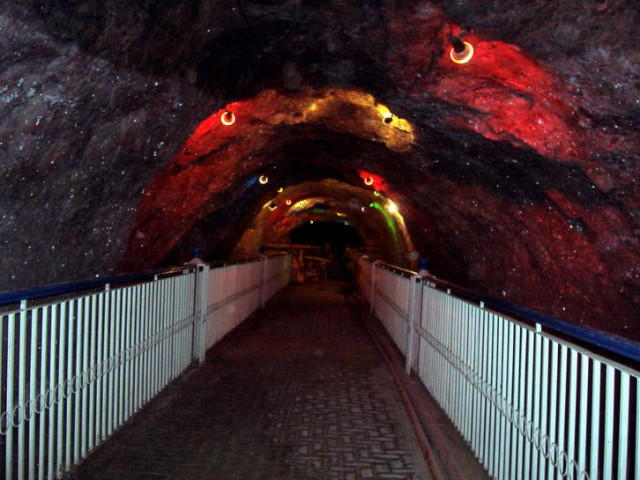Mining the opportunities at home
Himalayan salt originates in Pakistan - how this realisation changed a young entrepreneur’s life

Himalayan salt is popular worldwide, and yet, despite being one of the largest exporters of raw pink salt, for Pakistan, salt is rarely a matter of national pride.
As a college student in London, Irfan Chughtai, would often see pink salt products being sold at exorbitant prices at high-end stores. More often than not, the label would say, ‘Made in India’ or ‘Made in China’. It was a visit to Khewra in Jhelum, Punjab, during one of his semester breaks, that Irfan realised a crucial detail: the salt was mined in Pakistan.
Hailing from a business family, Irfan was struck with the potential that the ancient salt mines provided - not just as raw material for exports but as finished products that could be marketed as Pakistani.
A dream actualised
Irfan knew that entrepreneurship was in his blood.
It had been a tradition in his family that the children could earn extra pocket money by giving time to the family business - dealing in dyes and chemicals - and their ancestral shop in Jodhia Bazaar.
He had spent his childhood helping out with the family business and had learnt the tricks of trading. But he had also always known his career would have to be his own and he had an inkling that it would be in the export sector.
After his visit to the Khewra mines, Irfan knew the opportunities abroad could not compare with what he could achieve in, and for, Pakistan. Abandoning his undergraduate studies at Kingston College in London, Irfan moved back home. He completed a CBBA degree and an MBA in finance, and in 2004, he launched a small-scale pink salt business in Karachi.
Untapped potential
Once knee deep in the Himalayan salt business, Irfan quickly realised that the precious raw material was being sold to foreign countries for a song.
According to Irfan, most pink salt is exported from Pakistan at a meagre price of $0.35 per kilogramme. By providing a manufactured product, he knew he could charge much more.
Slowly and gradually he built an inventory of pink salt products - edible salt, black salt, glasses, tiles, lamps, night lights, therapy bricks, spa stones, salt cabins and the like. The possibilities were endless. The products made by Irfan’s company were launched in the Australian and United States of America markets. They quickly gained traction and became popular in Europe as well. They would each bare the label, “Made in Pakistan”.
A family business
Soon Irfan had his own successful family business. His wife, Shafaq, designed salt cabins when the demand for Himalayan salt therapies grew. She helped him market his products in the international market and launched enticing advertisement campaigns or the company.
Their efforts bore quick fruits.
An American company working alongside Irfan helped him acquire a contract with a restaurant in New York.
Irfan and Shafaq carved out decorative pieces from pink salt to embellish the restaurant’s interior and dispatched it to the USA.
This put the local business at the centre of the international market for pink salt and opened doors for future orders.
Feeding the local economy
Irfan’s company employs around 250 to 300 people - from transporting the raw material from Khewra to the workshop in Karachi, manufacturing the products and then exporting them.
Referring to factors hindering the growth of Himalayan salt market in Pakistan, Irfan says that mining in the country is done using ancient and outdated methods. The mining practices inefficient, unsafe for minors, and unsustainable, he adds.
According to him, contractors do not leave behind enough reserves behind during the mining process. This causes the naturally formed pillars to weaken and leads to cave ins at the mines. Given the unavailability of electricity, generators are used, and miners are forced breathe in toxic fumes, he says, adding that this also results in miners’ deaths.
After tensions with India escalated in 2019, the Pakistani government decided to employ Geographical Indication - a process to trademark Himalayan pink salt with its country of origin, Pakistan.
This move left Irfan overjoyed. He is optimistic about the future of pink salt. GI registration is a start, he says, adding that henceforth importers could approach Pakistan directly instead of turning to other countries for pink salt products.
He urges the government to modernise mining practices in the country as well. Besides, he suggests, that a minimum export value is set for pink salt and its export in raw form is discouraged.
This story is part of a weekly series that seeks to bring to light the unsung heroes of Karachi - the hawkers, traders, doctors, teachers, engineers, lawyers and daily-wage labourers. It is they who make Karachi the city of lights.
Published in The Express Tribune, March 1st, 2021.



















COMMENTS
Comments are moderated and generally will be posted if they are on-topic and not abusive.
For more information, please see our Comments FAQ